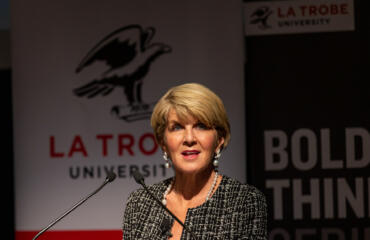“What can I do if I’m not given the chance to express my political will, or have the right to protest in my country?” – Chinese student studying at a Melbourne university, name withheld.
The milestone 30th anniversary of the Tiananmen Square protests saw commentators and international media trawling over the events of 1989, revisiting and analysing them through the lens of history and evolving international power shifts.
But for many Chinese students studying abroad, the archival accounts, graphic footage photographs and commentary came as a shocking revelation.
Through their lives growing up in China, discussion of what occurred in Tiananmen Square in 1989 has been a taboo. The events did not appear in the books they studied at school. Keywords such as “Tiananmen Square Massacre/Protest” or “June Fourth Incident” are blocked in Chinese search engines or media.

Homage to the Unknown Rebel/ Flickr, Francis Mariani
Now finding themselves outside the constraints of the Chinese media bubble during the saturation coverage the anniversary inspired, how has this hidden history been received?
Chinese students in Melbourne interviewed by The Citizen, who requested not to be identified because of the enduring political sensitivities, admitted they were confronted by the stark contrast between the Chinese state media version of what occurred that they had grown up with, and the western reporting they now had access to.
It seems the Chinese Communist Party (CCP) has a different understanding of “democracy”, they observed. Raising the topic was controversial, even between friends, who divided sharply on their interpretations of this history when The Citizen questions them.
Some students expressed astonishment and anger towards about what they had learned of the events of June 1989. They said they were now more apprehensive about the situation they would find when they returned to their lives in China.
One said: “I am very scared and astonished that in China at this stage … there is no freedom of speech. I didn’t realise this thing until I found a lot of words (unavailable) in the Chinese search engine.
“It’s easy to erase any person, any country out of history without any explanation.”
She was angry about the Chinese Communist Party’s attitudes and what she described as its lack of trust in people.
“There is no purpose for the communist party to crack down on the news … to erase the incident. It’s better to admit and apologise for what they’ve done because this is a part of history.”
Some students indicated that it was hard for them to accept the version of history they were receiving through the media available to them in Melbourne. Others were apathetic.
One student said he was feeling very conflicted towards the incident, as “Tiananmen Square is a very solemn place in my mind … I can still remember how excited I was when I first saw it in Beijing. It is hard to believe that”.
He believed that Chinese people were educated to love their country, and “that patriotic education has made us accept the positive things of the party instead of the negative ones”.
When asked if he expected to experience further tensions between the ambitions of the Chinese state and democracy when he returned to China, he said that while he wasn’t particularly stirred up about freedom of speech or democracy, he was “afraid the situation will become worse and worse”.
Some patriotic students spoke up in favour of the CCP and its actions.
One said: “I feel they (democracy activists) are brainwashed by the western media and utilised by some insurgents to believe only sacrifice can achieve democracy, so they take a very aggressive way revolting against CCP.
“I don’t believe the parochial reporting by western media. I believe some western media has exaggerated the scene at that time to stir up the situation in China.”
Democracy doesn’t fit Chinese society, where collectivism takes precedence over individualism, she said. “Every country has its own regulatory regime or political system. We aren’t the same as western countries which emphasise individualism and oppose everything threatening individual rights.
“The (lack of) democracy or the freedom of speech doesn’t concern me today if China goes though a good period of economic growth.”
Another student believed that the events of 1989 have been overly exaggerated. “There are so many positive news stories in China, why do western media only report the negative part? What western media report would let more people in the world think China is a place without democracy?
“I feel scared that our country is thought of that way by more and more people.”
International media and historians recall Tiananmen Square in the spring of 1989 as the scene of large-scale protests, the culmination of years of dynamic change which was then brutally crushed by China’s leadership. No-one knows for sure how many people died. Estimates range from hundreds to many thousands.
But today’s Chinese state media, the only authorised media interpreting the events within China, reports: “The protest (was) instigated by some anti-party and anti-socialist activities who destroyed China’s normal social order, disrupted the normal economic construction process, and caused great losses to the party, the country and the people.
“The crackdown is the victory countering turmoil and riots, consolidating the achievements of our country’s socialism, and has also provided useful lessons for the party and the people.”
Zhu Rongji, the first Vice Premier and then Premier of the People’s Republic of China from March 1998 to March 2003, was reported in the China Daily in 2010 saying: “(The) ‘Tiananmen Square Incident’ is a protest without legality” when he was questioned about democracy in China.
“Democracy should be considered on the premise of not harming public property and the public interest. The political turmoil that occurred in 1989 was because they wanted democracy, however, violating legal rules.”
*The reporter’s name has been withheld.




